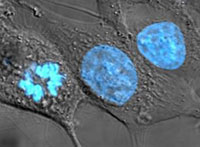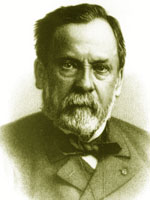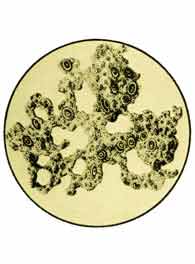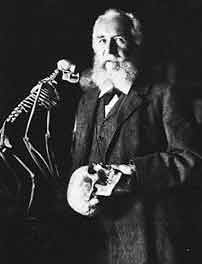 |
DIVIDING CELLS The most fundamental rule of life is the principle that "life comes only from life." A life form can originate only from another life form. |
 |
| Louis Pasteur |
For many people, the question of "whether men descended from apes or not" springs to mind when Darwin's theory is mentioned. Before coming to that, however, there are numerous questions the evolutionary theory needs to answer. The first question is how the first living organism appeared on earth.
Evolutionists answer this question by saying that the first organism was a cell that emerged from inanimate matter by chance. According to the theory, at a time when the earth consisted of inanimate rocks, soil, gases and so on, a living organism formed by chance through the effects of wind, rain, and lightning. This evolutionary claim, however, is contrary to one of the most fundamental rules of biology: Life comes only from life, which means that inanimate matter cannot generate life.
The belief that inanimate matter can produce life is actually a medieval superstition. According to this theory, called "spontaneous generation", it was believed that mice sprang naturally from wheat, or maggots arose "spontaneously" from meat. At the time when Darwin put forward his theory, the belief that microbes of their own accord formed themselves from inanimate matter was also very common.
 | "MUD THAT COMES TO LIFE" The scientific name of the picture on the side is "Bathybius Haeckelii", that is, "Haeckel Mud". Ernst Haeckel, an ardent proponent of the theory of evolution, came to observe the mud dredged up by an exploratory vessel and thought that it closely resembled some cells he had seen under a microscope. Thus, he claimed that it is an inanimate material that turns into a living organism. Haeckel and his associate Darwin believed that life was simple enough to be formed out of inanimate material. 20th century science demonstrated, however, that life can never arise from lifelessness.
|  Ernst Haeckel Ernst Haeckel |
The findings of the French biologist Louis Pasteur put an end to this belief. As he put it: "The claim that inanimate matter can originate life is buried in history for good."2
After Pasteur, evolutionists still maintained that the first living cell formed by chance. However, all experiments and research carried out throughout the 20th century ended in failure. The "chance" formation of a living cell aside, it has not even been possible to produce a living cell by a conscious process in the most advanced laboratories of the world.
  |
SPONTANEOUS GENERATION: A MEDIEVAL SUPERSTITION One of the superstitious beliefs held by medieval people was that inanimate matter could spontaneously give rise to life. It was believed, for instance, that frogs and fish formed spontaneously from mud lying in riverbeds. It was later revealed that this hypothesis, known as "spontaneous generation", was simply a fallacy. However, though somewhat later and with a slightly different scenario, this belief was revived under the name of "the theory of evolution". |
Therefore, the question of how the first living organism emerged puts the evolutionary claim into a quandary right at the first step. One of the chief defenders of the theory of evolution at the molecular level, Prof. Jeffrey Bada, makes this confession:
Today as we leave the twentieth century, we still face the biggest unsolved problem that we had when we entered the twentieth century: How did life originate on Earth?3
 | THE MYTH OF "CHEMICAL EVOLUTION" Renowned evolutionist Alexander Oparin came up with the idea of "chemical evolution" at the beginning of the 20th century. This idea holds that the first living cell emerged by chance through some chemical reactions that took place in primordial earth conditions. However, no evolutionist, including Oparin, was able to submit any evidence to support the "chemical evolution" allegation. On the contrary, every new discovery in the 20th century showed that life was too complex to have originated by chance. Well-known evolutionist Leslie Orgel makes this admission: "(Examining the structures of DNA, RNA and proteins), one might have to conclude that life could never, in fact, have originated by chemical means."4 |
While invalidating the theory of evolution, the law "life comes from life" also shows that the first life on earth came again from life, which means that it was created by God. He is the only One Who can give life to inanimate matter. In the words of the Qur'an, "It is He Who brings out the living from the dead, and brings out the dead from the living." (Surat ar-Rum: 19)
2) Sidney Fox, Klaus Dose, Molecular Evolution and The Origin of Life, New York: Marcel Dekker, 1977. S. 2
3) Jeffrey Bada, "Origins", Earth, Februar 1998, S. 40
4) Leslie E. Orgel, "The Origin of Life on Earth", Scientific American, Band 271, Oktober 1994, S. 78